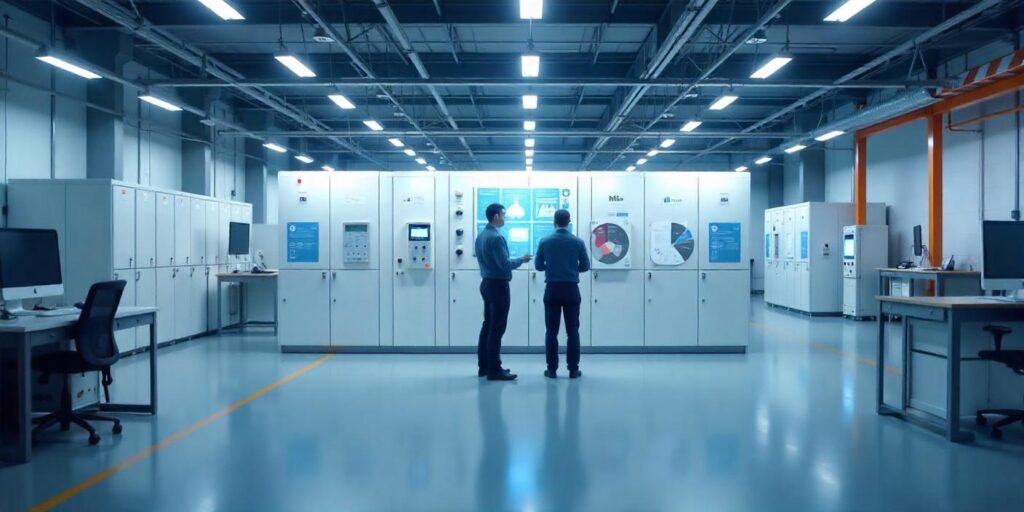Introduction:
As the world transitions into Industry 4.0, characterized by automation, data exchange, and smart manufacturing, the demand for efficient, reliable, and adaptable power distribution systems has never been higher. Modular Switch Rooms (MSRs) are emerging as a pivotal solution in this new industrial era. By integrating advanced technologies and embracing modular design principles, MSRs enhance operational efficiency, improve energy management, and ensure safety. This blog post explores the key benefits of Modular Switch Rooms in the context of Industry 4.0, highlighting their vital role in modern manufacturing environments.
The Evolution of Industry 4.0
Industry 4.0 represents a paradigm shift in manufacturing and production, driven by:
- Smart Manufacturing: The integration of IoT (Internet of Things) devices and sensors to enable real-time data collection and analysis.
- Automation and Robotics: The increased use of automated systems and robots to enhance productivity and efficiency.
- Data-Driven Decision Making: The utilization of big data analytics to inform operational strategies and optimize processes.
In this context, power distribution systems must be agile, scalable, and capable of supporting the diverse energy needs of advanced manufacturing processes.
Benefits of Modular Switch Rooms in Industry 4.0
- Smart Power Distribution: Modular Switch Rooms incorporate smart technologies that enable real-time monitoring and control of power distribution systems. Key features include:
- Remote Monitoring: Operators can remotely monitor energy consumption, identify anomalies, and adjust settings in real-time, enhancing operational efficiency and reducing energy waste.
- Data Analytics: Advanced analytics tools provide insights into energy usage patterns, enabling organizations to make informed decisions about energy management and resource allocation.
- Predictive Maintenance: One of the significant advantages of MSRs is their ability to facilitate predictive maintenance. By integrating IoT sensors and advanced diagnostics, organizations can:
- Anticipate Equipment Failures: Continuous monitoring of electrical components allows for the early detection of potential issues, reducing unplanned downtime.
- Schedule Maintenance Proactively: Organizations can schedule maintenance based on actual usage and performance data, optimizing resources and minimizing operational disruptions.
- Energy Efficiency: With sustainability being a core principle of Industry 4.0, Modular Switch Rooms help organizations achieve energy efficiency through:
- Optimized Power Consumption: Advanced control systems automatically adjust energy distribution based on real-time demand, ensuring efficient use of resources.
- Reduced Waste: By minimizing energy waste, organizations can lower their carbon footprint and operational costs, aligning with sustainability goals.
- Flexibility and Scalability: Modular Switch Rooms are designed for easy reconfiguration and expansion, making them ideal for dynamic manufacturing environments:
- Adaptable Layouts: As operational needs change, MSRs can be reconfigured to accommodate new equipment or processes without significant downtime.
- Scalable Solutions: Organizations can easily scale their power distribution systems by adding new modules to meet growing demands, ensuring long-term viability.
- Enhanced Safety Features: In an era where safety is paramount, Modular Switch Rooms incorporate various safety features to protect personnel and equipment:
- Arc Flash Protection: Advanced protective measures, such as arc flash detection systems, minimize the risk of electrical hazards, ensuring a safer working environment.
- Robust Enclosures: The design of MSRs includes features that contain potential electrical hazards, safeguarding employees and surrounding areas.
- Integration with Smart Grids: As the energy landscape evolves, the integration of Modular Switch Rooms with smart grids is becoming increasingly important. This integration allows for:
- Bidirectional Energy Flow: Organizations can generate, store, and distribute energy more efficiently, optimizing energy usage and reducing costs.
- Demand Response Capabilities: MSRs can respond to changing energy demands in real time, allowing organizations to take advantage of dynamic pricing models and enhance grid stability.
Conclusion:
Modular Switch Rooms are at the forefront of powering the Industry 4.0 revolution. Their smart technologies, flexibility, and scalability provide organizations with the tools they need to navigate the complexities of modern manufacturing. By enhancing power distribution efficiency, enabling predictive maintenance, and prioritizing safety, MSRs are not just a solution—they are a strategic advantage in an increasingly competitive landscape.
As industries continue to embrace the principles of Industry 4.0, investing in Modular Switch Rooms will be essential for organizations aiming to optimize their operations, improve energy management, and foster a culture of innovation. The future of manufacturing is here, and Modular Switch Rooms are leading the charge.







